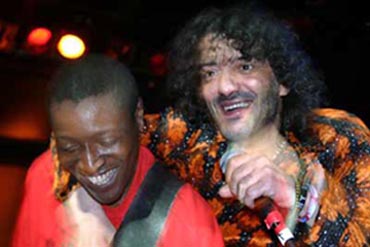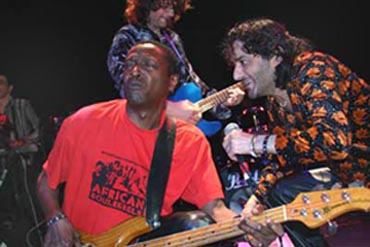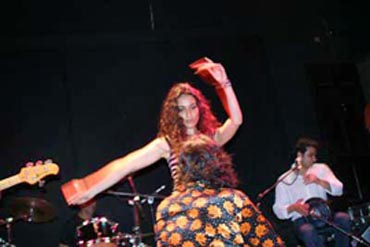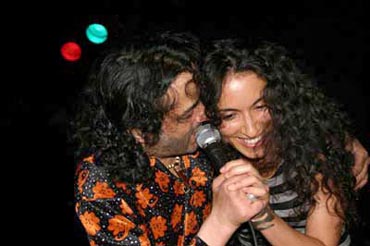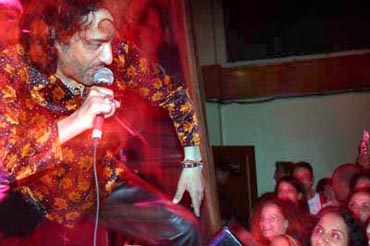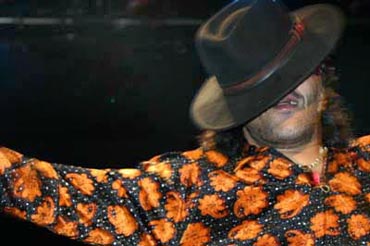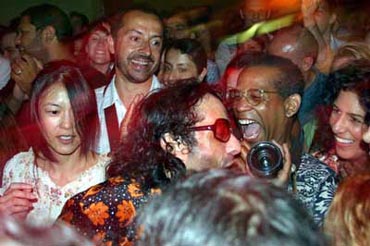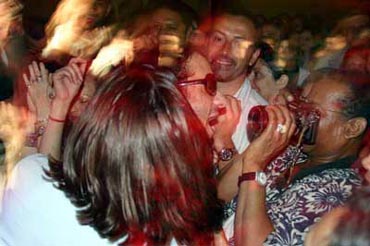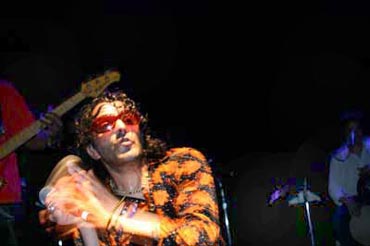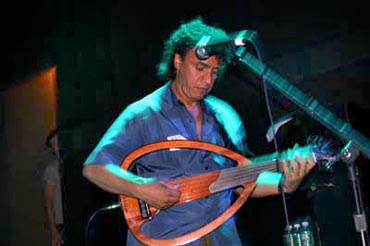Rachid Taha - Live concert review
Rachid Taha at The Bowery Ballroom, NYC, 7.06.2005
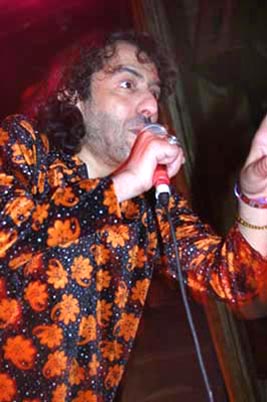
The single wooden stool set stage center looked oddly out of place as the lights fell to silence. A suspiciously regular looking chair, it must hold some place in Rachid Taha's heart, for his name was written in black Sharpie marker underneath the thin frame. Given the hyper rock'n'rai performances he's infamous for, I wondered how long it would remain standing. Within three minutes my hunch proved correct: not long at all.
Emerging from backstage in a stripped brown sports jacket, black leather pants, cowboy-ish hat and large, plasma-like sunglasses, the unshaven Taha looked like Bono having a Jim Morrison night. May be his, but I think he concurs with the lizard king in his love for Guiness pints. Stalking the stage like an ominous carnivore, he seemed extremely uncomfortable being confined to the stage (as a later walk through the frenzied-women-filled crowd verified). At the same time, his hunger for driving street music - Taha is a welcome addendum to the pop-filled roster of raï artists - has earned him the undisputed title of Algerian bad boy and, as he's known in France, the Aladdin chameleon.
Moving from Algeria to France at age 10, Taha first entered the music scene in 1982 with the band CARTE DE SÉJOUR. They released a four-track EP on Mosquito Records and were dubbed "French Rastas", fusing the expanding punk scene with reggae undertones, something THE CLASH introduced a few years prior (Taha paid homage on his latest album, "Tékitoi?", with his ingenious "Rock El Casbah"). Going from the minivan touring circuit to rock infamy in, he went solo in 1990 with "Barbès" and hasn't looked back. By the time his fourth solo record, "Diwân", dropped in 1998, his intercontinental fusion - now encompassing a heavy dose of electronics entwined with darbouka and oud classical stylings - made him iconic.
It's almost unfair to call Taha a raï artist, and not because he doesn't warrant the title. His music stretches so far beyond the scope of Khaled and Cheb Mami - the genre's most well-known artists - it's difficult to group them together. An urban music that evolved from Bedouin milhun poetry in Oran, raï went through numerous revolutions in its mainstream ascension: first, being a music of struggle in the '40s, then undergoing sonic evolution in the '60s, when guitars, bass and drums replaced the traditional gasba (rosewood flute) and guellal (drum). While Khaled uses Latin pop and bubbly reggae in his mix, and Cheb Mami tends to desert roses, Taha, to put into perspective, is like Robert Plant singing in French/Arabic/Spanish/English with heady digital beats. His closest connection to raï is etymological - the word means "opinion", and this outspoken artist has plenty.
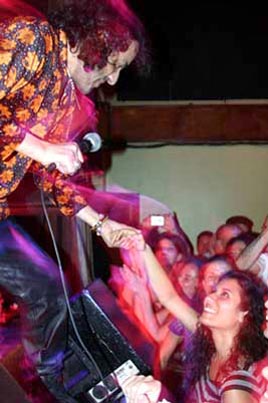
Enough history, informative as it is. Within three minutes - give or take two - the chair was either kicked or thrown aside and Taha began a dance that continued for two hours, a sort of Elvis-esque undulation ritual peppered with bodily thrusts across the floor that we might attribute to those aforementioned pints. His six-piece band, comprised of guitar, bass, drum kit, keyboards and the Arabic-leaning oud and darbouka, knitted a tight garment for Taha's random outbursts to quiet. They must know his antics well - the way he'd randomly silence instruments and put them in headlocks, fuzzing their hair, slapping strings and drums and all-around being a nuisance. But unless you haven't figured it out by now, Taha is a complete showman (as well as wonderful vocalist, even when falling off-key), and his band loved every minute.
As did the crowd. From the opening stool-kicking-and/or-throwing minute he invited the packed Bowery Ballroom inside his domain, and no one left. They couldn’t - the pounding rhythms of "Barra Barra" and "Bent Sahra" were too invasive. The repetitious strains of the electric oud, backed magnificently by the dirty funked-out bass, was aural hypnosis. They took songs well past their five-minute album mark - much more in the vain of "Live", which dropped in 2001. Not once did a musician fall out of the pocket, even with Taha's impractical joking; and, if I'm right, nearly no one noticed the lyric sheets he carefully placed below his monitor. So maybe those random floor flails, where he quickly turned page to page, were not so random after all.
Closing out his set with his CLASH tribute, "Rock el Casbah" is a signature headnod to 25 years in an industry he has steadily, steadfastly climbed. Just prior to rocking el Bowery, his infamous reworking of the once obscure "Ya Rayah" (penned in 1973 by Dahmane El Harrachi) set the crowd into fury. Again toying with the crowd's emotions, he began with a few minutes of sped-up and slowed-down a cappella - meriting the previously cited "off-tuneness". When the oud finally launched into that nostalgic line, everyone was gone, into a world where all the musics of this spinning globe play nicely, dirtily and hard. This is the universe of Rachid Taha, and if no one else is playing, that's no big deal. He'll inhabit it just the same.
Derek Beres
"Afropop Worldwide"
